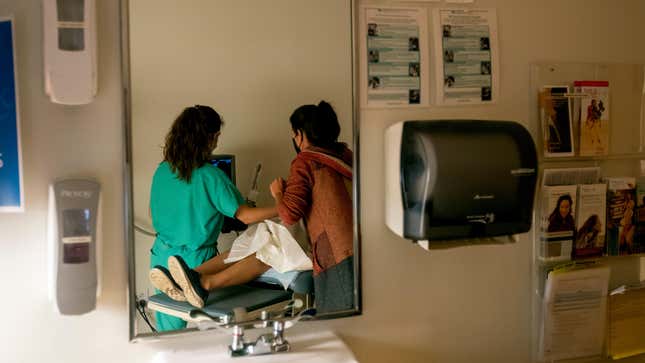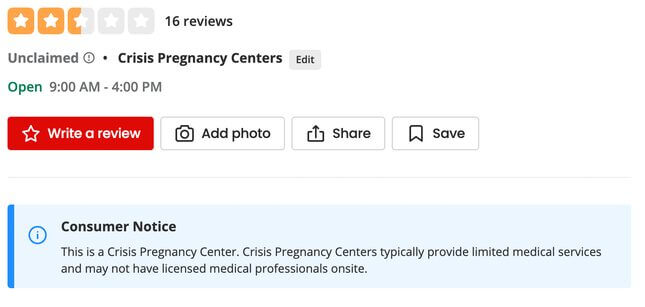Unlike Google, Yelp Won’t Let Crisis Pregnancy Centers Get Away With Lying Anymore
Yelp will now flag anti-abortion centers for "providing limited medical services" to protect abortion-seeking consumers.
AbortionPolitics

Starting Tuesday, Yelp will do what Google won’t, and shield pregnant people from being deceived by anti-abortion crisis pregnancy centers. Yelp has added a consumer notice to listings for CPCs that emphasizes how these facilities “provide limited medical services and may not have licensed medical professionals onsite.” Crisis pregnancy centers exist to prey on often low-income pregnant people seeking abortion care, where they then subject them to terrifying disinformation about abortion to persuade them to remain pregnant, and often collect and possibly share their private health data. Despite this, Google continues to prominently feature CPCs among its search engine results, at the peril of abortion seekers.
“Often, people think of Yelp and think of restaurants, but it’s a source that a lot of people go to when they’re looking at all sorts of different businesses and services,” Shireen Shakouri, deputy director of Reproaction, told Jezebel. Shakouri notes that for years, abortion rights advocates have left Yelp reviews on CPCs specifying that they’re “fake clinics,” but this additional step by Yelp “adds an important layer of trust.”
Since 2018, Yelp CEO Jeremy Stoppelman directed the company to distinguish CPCs from abortion providers, resulting in many being recategorized as “crisis pregnancy centers” rather than abortion clinics, according to Axios. But the company’s move on Wednesday is especially important as it explicitly states that CPCs—which receive massive amounts of public funding—often don’t have actual licensed health care workers. As Jezebel has previously reported, few provide ultrasounds and pregnancy tests that meet medical standards, and because they aren’t actual health care providers, they aren’t subject to HIPAA privacy standards about sharing patient data.
-

-

-

-

-

-

-

-

-

-

-

-

-

-

-

-

-

-

-

-

-

-

-

-

-

-

-

-

-

-

-

-

-

-

-

-

-

-

-

-









































